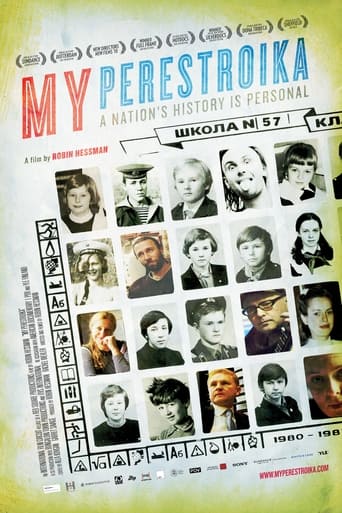

The Worst Film Ever
... View Moreif their story seems completely bonkers, almost like a feverish work of fiction, you ain't heard nothing yet.
... View MoreEach character in this movie — down to the smallest one — is an individual rather than a type, prone to spontaneous changes of mood and sometimes amusing outbursts of pettiness or ill humor.
... View MoreBy the time the dramatic fireworks start popping off, each one feels earned.
... View MoreMy Perestroika successfully portraits personal impressions about the Soviet Union offering a refreshing counterpoint of ideas between characters. Perestroika can be understood for many as a Russian word connected with an important moment in Russian history. I can say that after following the stories of these 5 friends in Moscow I have a deep sense of human connection and respect for people who was dramatically affected in the process that Russia held around the 90s. I have an understanding of what Perestroika meant for them.Parallels between how these characters grew up and how their children are growing up nowadays allow audiences to perceive the contrast between communism and capitalism. This humanist film is a refined documentary full of cinematographic details and relevant opinions about an important historic issue.
... View MoreMy Perestroika is a very strong documentary because Robin Hessman really connected with her characters. Characters drive the story, and by immersing herself in their world she was able to fully portray their feelings before, during and after the Russian revolution of the 1990's.My favorite part of the film is that it starts and ends with the first day of school in Moscow. The cyclical nature of this speaks volumes to the struggles in Russia and the nature of life itself. Problems do not simply disappear, their whispers remain in society. I was lucky enough to hear Hessman speak about her film, and she went out of her way to say that Moscow, like New York, cannot represent Russia as a whole. This is a very key point that, if misinterpreted, can change the way you look at the film entirely.
... View MoreI like this documentary, which recalls my memory in China. In some level, Russia is the big brother and father of China. We have the same faith, the same society mode, the similar party history and the similar memory about the past at once. Although the opening day of school in China is not as special as Russia's, it's also very important for every kid who is ready to begin their school life. We have the same red scarf, the young pioneer, the group activity out of campus, and a heart that is ready for constructing our country and socialism. We also have the firm faith of socialism, the three-years difficulty period, and finally have to learn how to confront the history and the collapse of the faith. Every September is the time for school to open. Every year, countless students come to school and begin their new life. Every generation has their difference and shares the similar experiences. They are the hot-blood young people at once. The school life for them is the perfect memory forever. Although society is changed, the leader is not the same one yet, they grew up, became rich or poor. They have suffered the pain and happiness. Their youth has been past as well as the heavy history. But the life is going on and the youth is going on.
... View MoreI was lucky enough to see "My Perestroika" at NYC's IFC Center, where director Robin Hessman answered questions following a screening of her film. She stressed that her documentary isn't so much representative of all Russians, but rather a cross-section of "ordinary Russians living in extra-ordinary times." Hessman focused her lens on five childhood classmates who entered school in communist Moscow but came of age during the fall of the Iron Curtain. She had incredible access to her five subjects: punk rocker Ruslan, single mom Olga, successful businessman Andrei, and married history teachers Borya and Lubya. By shooting solo (instead of relying on a cameraman), Hessman was able to develop a rapport with her subjects, prompting them to open up. Although they seemed nostalgic about their idyllic childhood, they also appeared to wish to leave it in the past. By the end, they all seemed nonchalant about the current government. The film's strength lies in its use of the subjects' own 8mm home movies (juxtaposed alongside vintage propaganda films). This film could easily have been constructed with talking heads waxing poetic about the fall of the USSR, but it wouldn't have been as compelling. By focusing on (relatable) characters, Hessman puts a face on the (last generation of the) Cold War, which until now had been a nebulous concept for me.By the end, I wanted to down vodka shots with Ruslan and Borya! My only gripe is that I wanted to see more interaction among the five childhood classmates. Olga lived around the corner from Borya and Lubya, but we never see them interact. We know Borya and Lubya still keep contact with Ruslan, but do any of them still keep in touch with Andrei and Olga? I suppose that is another strength of Hessman's storytelling...that she painted these protagonists in such a way that I wanted to know more about them. May I suggest a follow-up documentary?
... View More